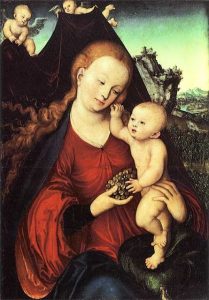“Filius ita factus est homo, ut a spiritu sancto sine virili opera conciperetur et ex Maria pura, sancta, semper virgine nasceretur…”
Dass der Sohn sei also Mensch worden, das er vom heiligen Geist ohn männlich Zutun empfangen und von der reinen, heiligen Jungfrau Maria geporn sei…”
That the Son became man in this manner, that He was conceived, without the cooperation of man, by the Holy Ghost, and was born of the pure, holy [and always] Virgin Mary. http://www.bookofconcord.org/smalcald.php#officeandworkofjesus
Above are the Latin and German statements from Marin Luther’s Schmalkaldic Articles, Part I, article 4. I have also provided the English translation (that combines the Latin with the German) above. If one wants to engender a discussion among Lutherans quickly, then he or she should assert that this article concerning Mary’s perpetual virginity is a statement of a confession. For an excellent online discussion of this topic see https://gottesdienstonline.blogspot.com/2010/09/et-tamen-virgo-mansit.html
My goal here is not to debate the Semper Virgine statement, but to point toward some of Martin Luther’s fascinating proclamations regarding the Blessed Virgin Mary.
“He [Jesus], indeed, was a genuinely true, natural human being, but not conceived or born in sin as all other descendants of Adam. That is why his mother had to be a virgin whom no man had touched, so that he would not be born under the curse, but rather conceived and born without sin, so that the devil had no right or power over him. Only the Holy Spirit was present to bring about the conception in her virgin body. Mother Mary, like us, was born in sin of sinful parents, but the Holy Spirit permitted the Virgin Mary to remain a true, natural human being of flesh and blood, just as we. However, he warded off sin from her flesh and blood so that she became the mother of a pure child, not poisoned by sin as we are.” Martin Luther, “First Sermon on The Day of Annunciation to Mary,” in The House Postils, vol. 3. ed. Eugene F.A. Klug (Grand Rapids 1996), p. 291.
Dr. Luther expressed the common understanding here that the Holy Spirit acted miraculously in Mary to keep original sin from affecting her Son, Jesus. The purpose of purifying the Virgin was so that she could give birth to a pure God-man. Even if Luther did not explicitly affirm the doctrine of the Immaculate Conception of Mary, he did assert that the Holy Spirit purified Mary in a special, miraculous manner. (On this issue see: http://www.patheos.com/blogs/davearmstrong/2015/09/luther-the-immaculate-purification-of-mary.html) *I am aware this is a pro-Roman Catholic site, but the sources are accurate.*
In a sermon on Mary’s visitation of Elizabeth, Luther emphasized St. Mary as an example of humility and chastity for all Christians, but especially for believing women. Luther described Mary’s humility when he proclaimed:
“She is the mother of God and the greatest of women in heaven and on earth. She forgets all else, every good thing, and with truly humble heart sets out on her way, not ashamed to wash diapers, gently care for and bathe the infant John, and so on. Such humility is truly something to behold. It would have been fitting had someone provided her with a gold carriage to ride in, drawn by four thousand horses, with trumpets heralding the carriage’s coming proclaiming that the greatest of all women was approaching, the princess of the whole human race! But there was nothing like this, only silence…That is the first virtue, great humility.” Martin Luther, “First Sermon for the Day of Mary’s Visitation,” in The House Postils, vol. 3. ed. Eugene F.A. Klug (Grand Rapids 1996), p. 344. [Emphasis added]
Luther then explained the example of Mary’s chastity and proper, public decorum. For example, she did not gossip or flirt, but instead performed humble tasks at the home of Elizabeth. It’s clear Luther wanted to address certain public vices. Finally, Luther explained:
“Mary’s example, therefore, should set a beautiful pattern for us to follow, though indeed we may be equally beautiful, learned, capable, wealthy, young, and strong. We must certainly not exalt ourselves but be humble, willingly and diligently serving others.” Ibid., 346.

